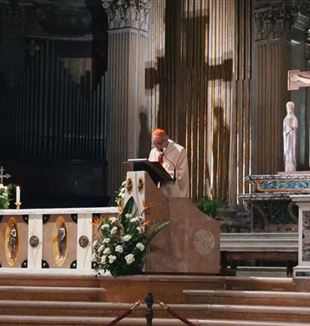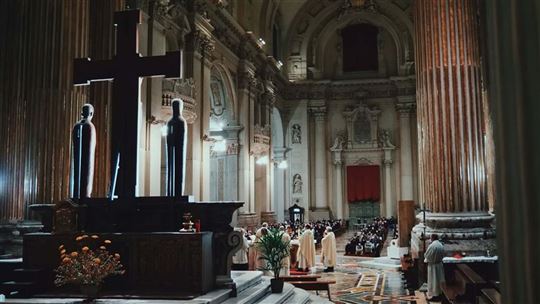
"He loved a Church that was strong only because it was full of the love of Christ”
The homily of Cardinal Matteo Zuppi, Archbishop of Bologna, at Mass for the centenary of Fr. Giussani's birth. Saint Peter's Cathedral, Bologna, Tuesday 22 February 2022.I am always struck by this (providential) coincidence that unites the day of Fr. Giussani's birth to heaven with the liturgical memory of the Chair of St. Peter. Peter presides over communion, recalling Jesus' unmistakable indication that the greatest is the person who serves. They are the servant of servants. The most eloquent and moving image for me in this regard is that of Giussani trying as best he could to get down onto his knees to show his veneration before St. John Paul II, the successor of Peter, during Pentecost 1998 in St. Peter's Square.
Communion always needs a paternity to be obeyed, but without lacking the freedom of intelligence and faith. Paternity, in fact, does not possess, but rather helps one to be oneself in the circulation of love that unites our persons and involves us all. Communion cannot be a fading reference point to avoid allergies to Christians who are reduced to single entities, too individualistic and unaccustomed to thinking together. The Church is communion and each of us is its expression and a protagonist. We know how divisions are never neutral and without consequences. We understand this in these dramatic hours for Ukraine and for everyone, which make manifest the fruits of the seeds of evil, the consequences of so much laziness that has allowed them to grow, the need for a loving force that unites and teaches love to recognize the enemy as a brother.
Tonight we give thanks for the gift of feeling part of this communion, of guarding it, of making it grow, of being faithful to it. Let us always defend communion, even more so in difficulties, because it is the holy bond that makes our human friendship full of meaning. Jesus questions us, "Who do people say I am?" Christians have always faced so much confusion around them. This does not shock Jesus, nor us, who are called to tell people that he is the Son of Man, and to say it through a beautiful and attractive life. Jesus asks us, too, "Who am I to you?" And it is always a personal question, but one that unites us to others. Fr. Giussani has helped many to answer this, making us feel the affective charge of the question; it is the question of a lover who seeks our love, not of a detached teacher who questions us to see if we have learned the lesson. Giussani helped us to perceive the question personally, not to evade it by hiding, answering anonymously or coldly; but as the father he was, he taught us to look for it in ourselves, that is, to find the seed planted in the soil of our garden, to cultivate it and to give reasons for our faith.
Today we begin the year of the centenary of his birth, giving thanks for the humanity and freedom of his faith, for the passion and intelligence with which he sought out people's questions, the profound questions that do not tolerate filters, prejudices, oppositions. He knew how to find, and it was not at all obvious, the spiritual question in people's hearts. He was in love with the human being because he was in love with Christ, interested in experience and not in laboratories full of intelligent but lifeless interpretations. Who am I to you? Who is He for you? The answer is not an unambiguous, approved formula. When people say that those belonging to CL are all very similar, it is a beautiful intuition because as brothers we resemble each other, and it is beautiful to resemble each other because we are brothers. In reality, it is not entirely true that we are similar because fraternity is made up of unique paths, which we sometimes find difficult to unite as communion is much more than democracy and it is found in real life, not in the living room or in the sacristy. It is a shame to interpret such differences “politically” and not as a richness or as a warning to strengthen even more what unites!
Giussani continues to propose to us today the radicalness of the beginning, of the personal change, the choice not to reduce Christ to a product for intimacy or individual well-being, or to a distant motivation to cover up individual choices that have little to do with Him. We give thanks for the many gifts received through his charism, for the novelties he has brought and continues to bring to our lives and to the lives of so many people in the world and in the Church, for being part of a people that embraces the world and has not stopped wanting to change it. Aware of this gift, we realize what the Church is calling us to at this juncture in our history.
Giussani said: "All my human preference is for You, all the preference of my mind, all the preference of my heart; You are the extreme preference of life, the supreme excellence of things. I don't know, I don't know how, I don't know how to say it and I don't know how it can be but, in spite of all I have done, in spite of all I can still do, I love You." Preference, because in Christ we have found everything we were looking for and need. We are also preferred, loved, and because of that, brothers filled with humility and gratitude. Love is stronger than the inevitable trials in personal relationships, and it is stronger than human fatigue. Yours is a communion that does not expire, but that has accompanied many of you since your youth, overcoming difficulties and making them, like wrinkles on people's faces, beautiful because they are a sign of true life.
Giussani loved a Church that was strong but not self-satisfied. It is strong only because it is freely full of the love of Christ, it is "movement" within history in order to encounter the great longing for God hidden in people's hearts. He said that he had not wanted to indicate a path, but the path towards the solution for the existential drama of the human. The path is Christ; the more we travel, the more it opens up before us. This is what he said about himself: "Not only did I have no intention of ‘founding’ anything, but I believe that the genius of the Movement that I saw coming to birth lies in having felt the urgency to proclaim the need to return to the elementary aspects of Christianity.” This is perhaps even more true today! He could not accept - and he realized it when the churches were still full of young people – that disconnection between faith and life, between the passion, the desire for happiness, the desire to understand and build, the love of young people, and faith. A God who is not discovered as a companion on a journey, with whom one can live everything, sooner or later becomes an abstract, hostile, useless God, he said. The encounter with Jesus and the companionship of brothers and sisters protect us from the risk of Christianity reduced to an ideology that does not listen and does not know how to speak, but gives us the security of being on the right side.
It is much easier than one might think to find oneself in an ideological attitude, seeking the program and not the path, the letter and not the spirit, the form and not the substance, the skin and not the marrow. It is enough to encounter Jesus and to understand in the many encounters along the road His sweet and direct question "Who am I for you?". This is the beauty of your charism, for which everyone has always been responsible. This is certainly nothing new; on the contrary, it has always been the responsibility that has moved your personal choices and that today asks you again for humility and passion to rediscover the essential, to put yourself into play, to love the unity that Carrón – whom we thank heartily for his generous service – and now Prosperi represent.
Read also - "Giussani, a man of profound humility and great obedience to the Pope and the Church"
"Don't be satisfied with little things, because God wants great things. If you are what you must be, you will set the whole world on fire," said St. Catherine of Siena. This, for the Church and for the world, and also for your fraternity, is a propitious moment in which each person is asked to take responsibility for the charism. If this truly happens each person, wherever they are called, will be able to bring that fire, that enthusiasm for Christ with which Giussani has helped us encounter Jesus’ love. There are turning points in life that seem difficult to overcome. Yet in obedience to Christ and the Mother Church, these obstacles will be reason to live the love of the beginning and for a new beginning, quite different from starting over in an adolescent sense. It is only thus that the past is not lost.
Wisteria grows by overcoming the obstacles it encounters, modelling itself on them and wrapping itself around them, without stopping, and it reveals such extraordinary strength that the bends and folds of life allow it to flourish. May it also be so for that seed that has grown from the charism of Fr. Giussani and that still wishes to bear more fruit. The Church and the world need you, together and individually; they need your unique accent. If you are what you must be, you will set the whole world on fire.”#100Initiatives